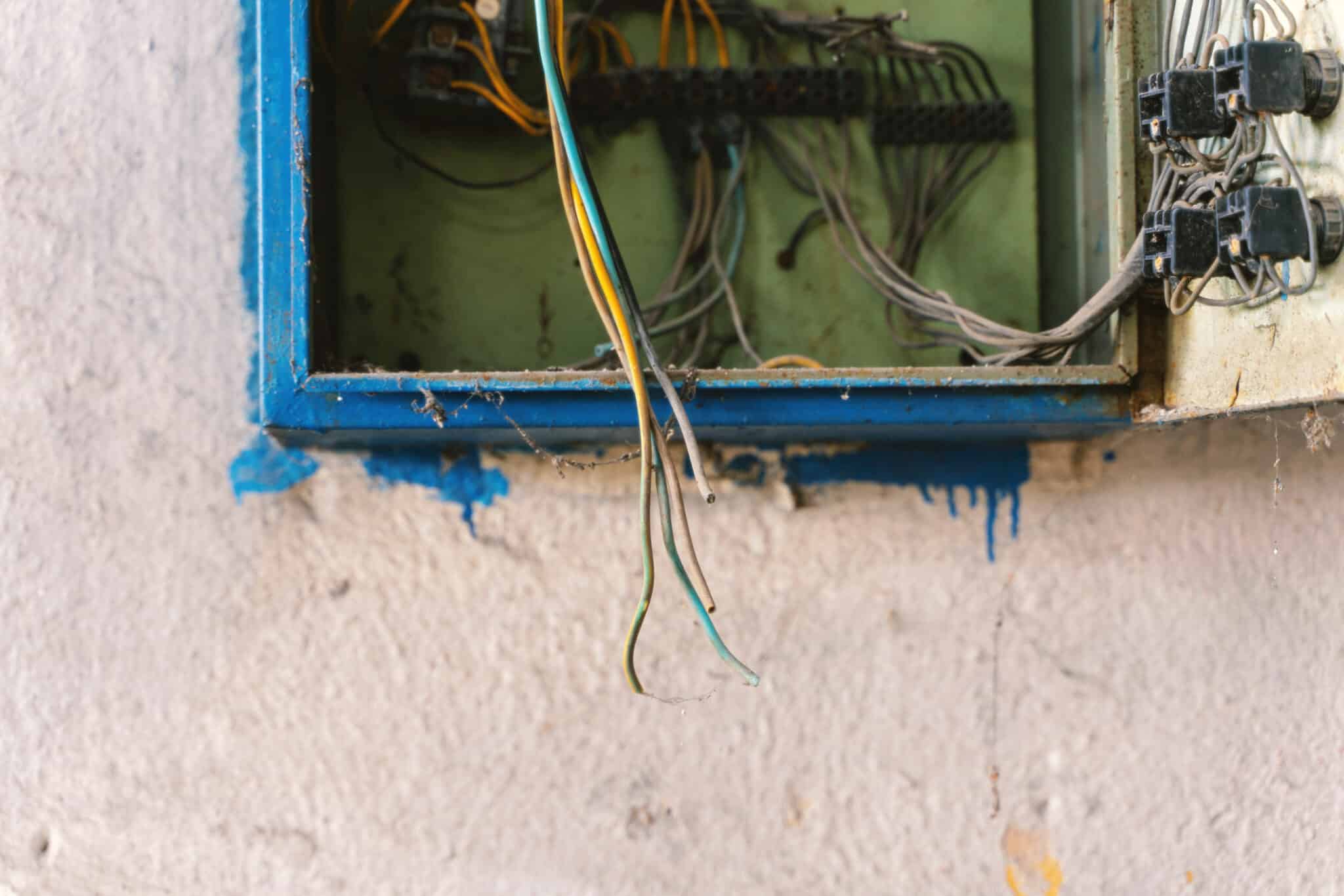Older homes have charm and character, but behind the walls could lie hidden dangers—one of the biggest being electrical fires. The risk of electrical fires is significantly higher in older homes due to outdated wiring, overloaded circuits, and insufficient safety standards at the time of construction.
These issues often go unnoticed until it’s too late, leaving families vulnerable to devastating accidents.
Understanding Electrical Fires in Older Homes
Electrical fires are a common hazard in older homes due to outdated and overworked systems. Many older houses in areas like West Columbia, Lexington, and Irmo were built during times when electrical demands were much lower, leaving their wiring and circuits unprepared for modern appliances and devices.
Over time, wear and tear on the electrical components, combined with outdated safety standards, increases the risk of sparks and overheating.

Common Causes of Electrical Fires in Older Homes
1. Outdated Wiring
Older homes often have wiring systems that were state-of-the-art decades ago but are now considered hazardous. Materials like aluminum or fabric-insulated wiring degrade over time, becoming brittle and prone to overheating.
These outdated systems struggle to handle modern electrical loads, creating hotspots that can ignite nearby materials.
In regions like Lexington and Irmo, homes built in the mid-1900s frequently feature this type of outdated wiring, which poses a serious fire risk. Replacing these older systems with modern copper wiring is one of the most effective ways to reduce the likelihood of electrical fires.
2. Overloaded Circuits
Modern households rely on significantly more electricity than homes of the past, with items like air conditioners, gaming consoles, and kitchen appliances all competing for power. Many older homes were designed for simpler times and lack the circuit capacity to safely handle these demands.
When circuits are consistently overloaded, they heat up and can eventually spark an electrical fire. This issue is particularly common in neighborhoods where historic homes have been repurposed for modern living without upgrading the electrical systems.
3. Lack of Grounding
Many older electrical systems lack proper grounding, which is a critical safety feature in preventing electrical faults. Without grounding, excess electrical currents have no safe path to dissipate, increasing the chance of sparks or overheating.
Grounding also protects against electrical shocks, which adds another layer of safety to a home’s system. Homes in areas like West Columbia and Columbia with systems built before the 1970s often require significant upgrades to meet modern grounding standards.
Installing proper grounding not only reduces the risk of electrical fires but also ensures a safer living environment for the family.
4. Faulty Outlets and Switches
Outlets and switches in older homes wear down over time, leading to loose connections and sparks. These sparks can ignite flammable materials like carpeting, curtains, or dust buildup near the outlet.
In addition, outdated outlets often lack modern safety features like tamper-resistant designs or ground fault circuit interrupters (GFCIs).
The wear and tear are common in historic homes across regions like Lexington and Irmo, especially in those that haven’t undergone recent renovations. Upgrading these components with newer, safer versions can significantly reduce the risk of fire.
5. Absence of Circuit Breakers
Many older homes rely on fuses rather than circuit breakers, which are less reliable and effective in protecting against electrical overloads. Fuses can only handle limited currents, and when they fail, the risk of electrical fires increases dramatically.
Modern circuit breakers are designed to quickly shut off power to prevent overheating or sparking, making them an essential upgrade for older homes.
In areas like West Columbia and Columbia, older neighborhoods often feature homes with outdated fuse systems that should be replaced. Installing circuit breakers provides peace of mind and essential protection against electrical fire hazards.
Signs Your Older Home May Be at Risk
Frequent Circuit Breaker Trips
If your circuit breakers trip often, it’s a sign that your electrical system is overloaded or malfunctioning. Older homes, especially those in places like West Columbia or Irmo, are more prone to this because their circuits weren’t designed to handle today’s energy-intensive appliances.
Frequent tripping is a warning that the system is struggling to keep up, which can lead to overheating or sparking. Ignoring this issue can result in more significant damage, including electrical fires. Addressing the underlying cause with an electrician can prevent these frequent interruptions and reduce fire risk.
Flickering or Dimming Lights
Flickering or dimming lights can indicate faulty wiring or overloaded circuits, both of which are common in older homes. This issue often occurs when a large appliance, such as a microwave or heating and cooling system, draws more power than the system can handle.
Homes in Lexington and Columbia with older electrical systems frequently experience this problem, especially during peak usage times.
While it might seem like a minor annoyance, it could signal a more severe issue within your wiring. Upgrading the wiring or redistributing the load across circuits can eliminate this problem and improve overall safety.
Burning Smell or Scorch Marks
A burning smell or scorch marks near outlets or switches is a clear sign of electrical danger. These indicators suggest that components are overheating, potentially due to loose connections, faulty wiring, or overloaded circuits.
In areas like West Columbia and Lexington, where older homes often feature aging electrical systems, this issue is particularly concerning.
Over time, the heat generated can ignite surrounding materials, leading to an electrical fire. If you notice these warning signs, turning off the power and consulting an electrician immediately is critical to avoid further damage.
Warm Outlets or Switches
Outlets or switches that feel warm to the touch are another warning sign of an underlying electrical issue. Overheating can occur when electrical currents pass through loose connections or outdated components.
This is especially common in homes with older wiring systems found in neighborhoods like Irmo and Columbia. Warm outlets are a precursor to more severe problems, such as sparking or fire. Replacing faulty components and ensuring proper connections can prevent this issue from escalating.
Age of the Electrical System
If your home’s electrical system is over 30 years old, it’s likely due for a thorough inspection and potential upgrades. Older systems weren’t built to accommodate the energy needs of modern households, which increases the likelihood of problems like overheating or short circuits.
Many homes in areas like Lexington and Irmo have systems that date back several decades, making them particularly vulnerable. Upgrading to a modern electrical system not only reduces fire risk but also improves overall efficiency and functionality.
Upgrading Electrical Systems to Prevent Fires
Replace Old Wiring
Replacing outdated wiring is one of the most crucial steps in preventing electrical fires in older homes. Worn-out wiring materials like aluminum or fabric insulation, commonly found in older houses across West Columbia and Lexington, are not built to handle today’s electrical loads.
Over time, these materials degrade, becoming prone to overheating and sparking. Upgrading to modern copper wiring ensures that your system can safely handle current electrical demands.
While it’s an investment, this update significantly reduces fire risk and enhances the overall safety of your home.
Install Circuit Breakers
Homes relying on outdated fuses instead of modern circuit breakers are at a higher risk for electrical fires. Circuit breakers are more effective because they automatically cut off power during an overload, preventing overheating or sparking.
Many homes in areas like Irmo and Columbia still have fuse-based systems, which are less reliable and harder to replace.
Installing circuit breakers not only improves safety but also makes it easier to reset your system in case of an issue. This upgrade is a must for homeowners looking to modernize their electrical systems.
Add Grounding
Proper grounding is essential for any safe electrical system, but many older homes lack this feature. Grounding provides a safe path for excess electricity, reducing the chances of sparks or shocks. In neighborhoods with historic homes, like those in Lexington and West Columbia, grounding issues are a common hazard.
Adding or updating grounding connections protects your home from electrical faults and improves compatibility with modern appliances. It’s a straightforward but vital improvement that brings peace of mind to homeowners.
Upgrade Outlets
Outdated outlets not only struggle to keep up with modern electrical needs but can also pose significant fire risks. Old two-prong outlets, for example, lack grounding and are more likely to overheat.
Replacing these with tamper-resistant or GFCI (Ground Fault Circuit Interrupter) outlets is an excellent way to enhance safety. GFCI outlets, in particular, are designed to shut off power immediately when they detect a fault, making them ideal for kitchens, bathrooms, and outdoor areas.
Homes in places like Columbia and Irmo can benefit greatly from these upgrades, especially in rooms with heavy appliance use.
Schedule Regular Inspections
Regular electrical inspections are a key preventative measure for older homes. Professional electricians can identify hidden hazards like loose connections, degraded wiring, or overloaded circuits before they lead to problems.
Homeowners in areas like West Columbia and Lexington often find that these inspections reveal issues they weren’t even aware of.
Scheduling an inspection every few years—or sooner if your home shows signs of trouble—ensures your system remains safe and up to date. It’s a proactive approach that saves money and stress in the long run while significantly reducing the risk of electrical fires.
Modern Solutions for Electrical Safety
Arc Fault Circuit Interrupters (AFCIs)
Arc Fault Circuit Interrupters (AFCIs) are one of the most effective tools for preventing electrical fires. These devices detect dangerous electrical arcs, which can occur when wiring or connections are damaged, and shut off power before the arc leads to overheating or a fire.
Older homes in areas like Lexington and West Columbia benefit greatly from the addition of AFCIs, as they address risks that traditional circuit breakers may miss.
Installing AFCIs in key areas of your home, such as bedrooms and living rooms, provides an extra layer of protection and peace of mind.
Smart Home Technology
Smart home technology offers modern solutions for monitoring and managing your electrical system. Devices like smart plugs and energy monitors can alert you to potential issues such as overloading or overheating circuits.
Many homeowners in Columbia and Irmo are turning to these tools to gain real-time insights into their electrical usage and detect abnormalities early.
This technology not only enhances safety but also helps reduce energy waste by identifying inefficient devices. Incorporating smart tech is a convenient and forward-thinking way to maintain a safe electrical system.
Whole-Home Surge Protection
Power surges can damage appliances and electronics, but they also increase the risk of overheating and fires within your electrical system. Installing whole-home surge protection ensures that excess electricity is safely diverted, preventing damage to your wiring and connected devices.
Homes in areas prone to storms or power fluctuations, like those in Lexington and Irmo, can especially benefit from this upgrade. Whole-home surge protection is a relatively simple addition that provides significant long-term benefits for your home’s safety and functionality.
Smoke and Carbon Monoxide Detectors
Smoke and carbon monoxide detectors are essential components of any home safety plan. Modern detectors are more sensitive and reliable than older models, providing early warnings in case of a fire or gas leak.
Placing these detectors near bedrooms and living areas is particularly important for older homes, where electrical fire risks are higher.
Many homeowners in West Columbia and Columbia are opting for interconnected systems, where detectors communicate with each other, ensuring the alarm is heard throughout the house. This added layer of protection can be life-saving in emergencies.
Why Professional Electrical Inspections Are Crucial
Identifying Hidden Risks
Electrical fires often start from hidden risks that aren’t immediately visible to the untrained eye. Professional electricians can uncover problems like damaged wiring, overloaded circuits, or improper connections that increase the likelihood of electrical fires.
This is particularly important for older homes in areas like West Columbia, Lexington, and Columbia, where aging electrical systems may harbor unseen dangers.
An inspection ensures that no issue goes unnoticed, giving homeowners confidence in the safety of their electrical systems. Regular inspections can identify these risks early and prevent costly or dangerous situations.
Ensuring Compliance
Older homes often fall short of modern electrical codes, which are designed to reduce the chances of electrical fires and enhance overall safety. Professional electricians can update your system to meet these standards, ensuring it complies with the latest safety regulations.
Homes in areas like Irmo and Lexington, built decades ago, frequently need these updates to remain safe and functional.
Compliance doesn’t just protect against electrical fires—it can also lower insurance premiums and increase the value of your home. Ensuring compliance is a smart investment for any homeowner concerned about long-term safety.
Extending System Lifespan
Electrical systems that are well-maintained last longer and perform better. Regular inspections can identify small issues before they become major problems, which could lead to electrical fires or expensive repairs.
Homes in Columbia and Lexington often show signs of wear in their wiring and outlets after decades of use, and proactive maintenance can save homeowners from unexpected breakdowns.
A longer lifespan for your system means fewer replacements and fewer risks of malfunctions that could ignite electrical fires. By scheduling routine inspections, you ensure that your system runs efficiently for years to come.
Peace of Mind
Nothing is more important than the safety of your family and home. Knowing that your electrical system has been professionally inspected and updated to minimize the risk of electrical fires provides peace of mind.
For homeowners in Irmo, West Columbia, or surrounding areas, this reassurance is invaluable, especially when dealing with older homes.
Inspections ensure that your system is in optimal condition, protecting your loved ones and your property from potential disasters. With professional oversight, you can rest easy knowing your home is safeguarded against electrical fires.
Protect Your Home from Hidden Electrical Hazards Today!
Outdated wiring and aging systems can put your home and family at risk. Mister Sparky of Columbia proudly serves West Columbia, Lexington, Irmo, Columbia, and surrounding areas with expert electrical services to keep your home safe.
Whether it’s an inspection or a system upgrade, our licensed electricians are ready to help. Contact us today and ensure your home’s electrical system is safe and reliable!

Frequently Asked Questions (FAQs)
1. How often should I have my older home’s electrical system inspected?
At least once every 3-5 years, or sooner if you notice signs of trouble like flickering lights or frequent circuit breaker trips. Regular inspections help catch potential risks for electrical fires before they become dangerous.
2. Can I replace the old wiring myself?
No, replacing old wiring should always be handled by a licensed electrician. DIY electrical work in older homes can be extremely dangerous and increase the risk of electrical fires if not done correctly.
3. Are aluminum wires in older homes dangerous?
Yes, aluminum wiring is prone to overheating and can be a significant fire hazard. It’s essential to either replace aluminum wiring or retrofit it with connectors designed to minimize the risk of electrical fires.
4. How can I reduce the risk of an electrical fire in my older home?
You can reduce the risk by upgrading old wiring, installing modern circuit breakers, adding grounding, replacing worn-out outlets, and scheduling regular professional inspections. These steps address the most common causes of electrical fires.
5. What are the signs of an electrical fire risk?
Signs include frequent breaker trips, flickering lights, warm or discolored outlets, a burning smell near electrical components, and scorch marks. If you notice any of these, it’s crucial to address them immediately to prevent electrical fires.




